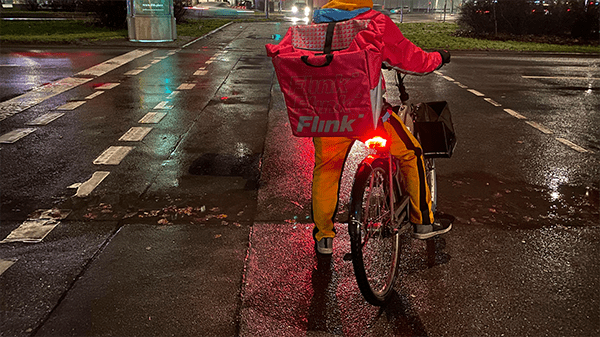Rapid online grocery is getting a lot of attention – and investment – lately, but I have to wonder how many of these services will make it in the long run.
Getting groceries delivered in 10, 15, or even 30 minutes – from a suburbanite’s point of view – seems indulgent, and that’s not because I live too far from a store to pick up something quickly.
I could literally go out my front door and walk 2000 feet (through a cow pasture and a hockey arena parking lot) to get to the nearest Whole Foods, but driving there to pick up some last-minute groceries would definitely take me more than 30 minutes.
So, when we get news releases for Buyk, Gorillas, Food Rocket, DoorDash (just to name a few) garnering huge investments and opening in new markets, I have to wonder how much demand there is for the service, how much it costs, and how sustainable it is in the long run.
On a recent trip to Berlin (where rapid online grocer Gorillas is based) I saw numerous delivery bikes for the service, and its competitor, Flink, and even encountered two of the retailers’ dark stores a few hundred feet from each other.
To be honest, they’re a bit of an eyesore. The Flink storefront has blank windows covered with bright pink stickers and branding, and the Gorillas storefront had some signage and the ubiquitous Berlin graffiti. Judgy German neighbors can’t be happy about these taking up space in their neighborhoods. A recent New York Times article suggests they’re not: Will Rapid Grocery Delivery Change N.Y.C.? Look to Berlin. Neighbors don’t like the dark storefronts, and they worry about the future of small grocers, called spätkauf (German for “late purchase” but translates closer to what we’d call a bodega).
So, it’s not surprising that urban areas in New York have similar concerns.
Another article from Business Insider suggests that Gorillas is adapting its strategy in the U.S.
The company already dropped its 10-minute time frame, and now plans to turn the lights on at its dark store locations and create a waiting room for customers to allow grocery pickup.
I’ve seen a similar concept at a Carrefour pickup in Paris.
BOPIS, buy online pick-up in store, has been the darling of the pandemic, with retailers – not just grocers – across the U.S. adjusting their stores and parking lots to accommodate demand.
There are a lot of players in the rapid grocery market at the moment. I think we’re going to see a wave of consolidation as they figure out how to make it work in America’s biggest cities.
For those of us in the ‘burbs, we’ll just have to hoof it to the store ourselves for those last-minute ingredients.



